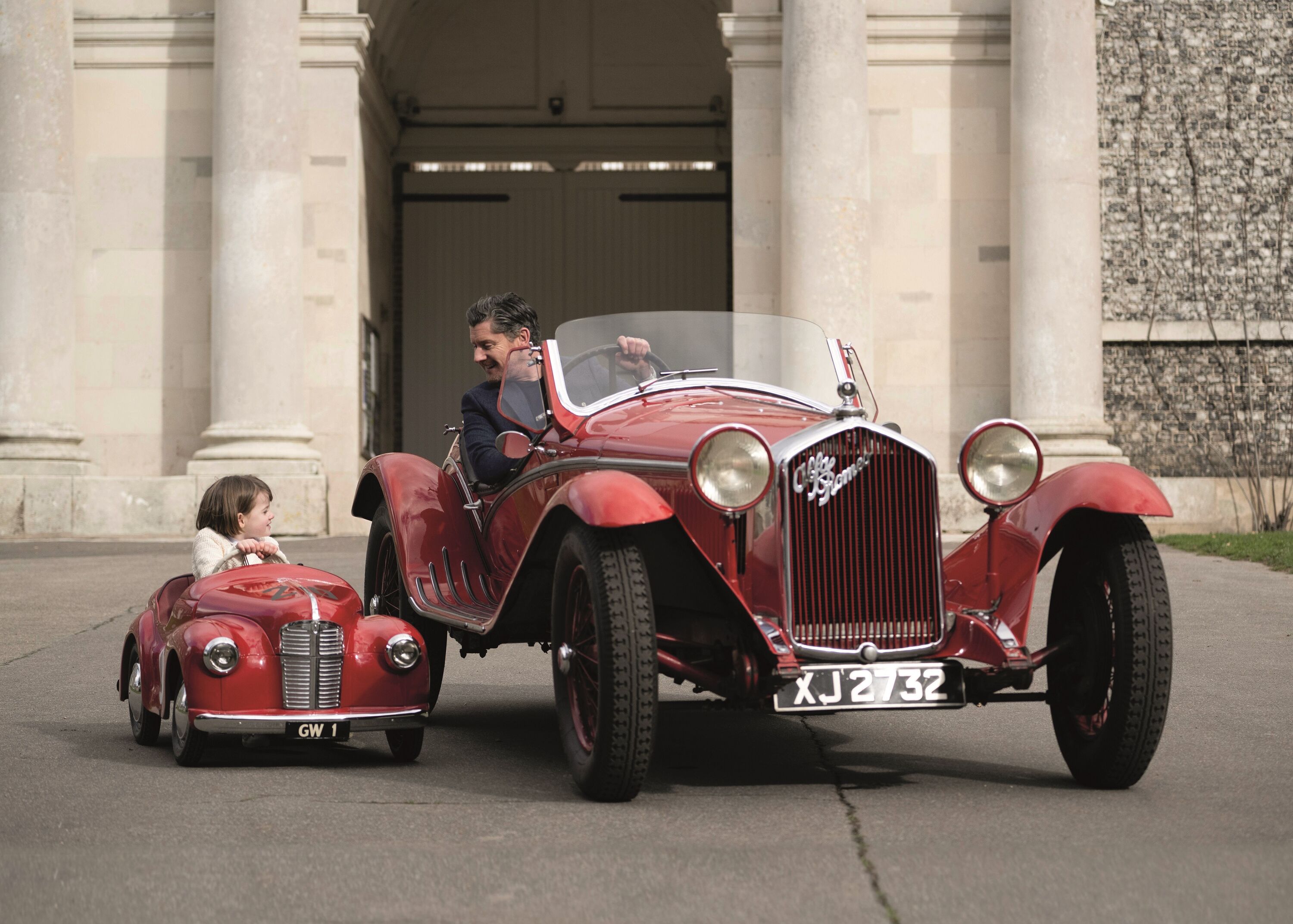The Champions: F1 75 at the Festival of Speed
Thirty-four people have won the Formula 1 World Drivers’ Championship, 34 drivers who have, at some stage in their career, earned the right to call themselves the very best in the world. Seventeen of those have the elite distinction of winning it more than once, while several of the sport’s most celebrated talents were never able to reach the pinnacle, which underlines the scale of the accomplishment.

To be known as an F1 World Champion is to become immortal, and their achievements will be celebrated as one of the six points of focus as part of the wider celebration of F1 75 at the 2025 Festival of Speed presented by Mastercard.
Set to be the grandest celebration in the history of the Festival of Speed, the 75th anniversary of the F1 World Championship will sit at the centre of all four days of activity both on and around the famous Goodwood Hill. As part of that showcase, we want to tell the story of F1’s greatest drivers, the Champions.
Giuseppe Farina was the first ever F1 World Drivers’ Champion in 1950 when, at the age of 43, he piloted the dominant Alfa Romeo 158 ‘Alfetta’ to three victories at Silverstone, the Swiss Grand Prix at Bremgarten, and Monza. He saw off the challenge of an Argentine by the name of Juan Manuel Fangio, who would forge his own legend as one of the greatest racing drivers in history over the next decade.
It was another Italian however, Alberto Ascari, who became the first multiple-time champion with victories for Ferrari in 1952 and ’53, the latter a particularly dominant season as he won six Grands Prix in a row to waltz to the title.
After his title in ’51, Fangio took four on the spin from 1954-’57 driving for Maserati, Mercedes-Benz and Ferrari, eventually winning almost half of the races he started and walking away from the sport in 1958 with a record that would remain unbeaten for almost half a century.
That season in ’58 saw Mike Hawthorn crowned the first British champion, while Vanwall made it a clean sweep for the Home Nations as it claimed the inaugural Manufacturers’ Championship. Jack Brabham won back-to-back titles in ’59 and 1960 to hail the beginning of F1’s second decade, before Phil Hill secured the first of the USA’s two title triumphs.
The ‘60s were primarily the decade for Great Britain, as a new era of exciting talents emerged, peddling innovative machinery from Lotus, BRM and Cooper. Graham Hill took titles in 1962 and ’68, Jim Clark’s sparkling but tragically short career yielded two Championships in ’63 and ’65, and John Surtees claimed the distinction of being the only World Champion on two and four wheels with his victory for Ferrari in 1964.
New Zealand’s Denny Hulme broke the run of British dominance in 1967, but Sir Jackie Stewart took up the torch with the first of his championship triumphs in 1969. He followed that up with two more in 1971 and ’73, his wins separated by Jochen Rindt – to date F1’s only posthumous World Champion – and Emerson Fittipaldi in 1970 and ’72, respectively.
Fittipaldi joined the growing list of multiple-time champions in 1974 before the arrival of the next all-time great, Niki Lauda. But for his fiery crash in 1976, there was every chance he could have won three or even more consecutive World Championships. As it was, he won his first in 1975, before James Hunt pipped him at the final round of the legendary 1976 season. Lauda regained his crown in ’77, but then would not top the tree again until he returned to F1 with McLaren years later. He completed his trio of triumphs seven years later in 1984, rounding off the longest gap between two titles for a single driver.
Jody Scheckter claimed the final Championship of the 1970s for Ferrari, and it was Alan Jones who became the second Australian champion in 1980 as he claimed the first Drivers’ title for Frank Williams.
Nelson Piquet won the first of his three titles in ’81 before Keke Rosberg brought the trophy to Finland for the first time in ’82. Piquet would triumph again in ’83 and ’87, but it was Alain Prost’s first Championship win in 1985 that signalled the arrival of a true F1 legend. He spurred on the efforts of a generation as the likes of Ayrton Senna, Nigel Mansell and Piquet all fought to overcome the great Frenchman, who eventually retired in 1993 as a four-time champion. Prost won again in ’86, before he was joined at McLaren by Senna, who immediately made an impact to claim his first title in 1988.
The rivalry that followed between those two great drivers will never be forgotten, as the pair traded championships in controversial and acrimonious circumstances. Prost got the better of his illustrious team-mate in ’89, but Senna returned the favour in ’90 after the Frenchman had moved to Ferrari. Senna took a third title in 1991, before Mansell Mania took over the world of motorsport in 1992. After several near misses, the British hero finally achieved immortality as an F1 World Champion, becoming the first British winner since James Hunt 16 years earlier.
Prost claimed his final championship in ’93, and then a new era began in 1994 as Michael Schumacher took over the mantle as the best driver in the world. His first triumph was perhaps the most controversial of them all, but there was no question about his superiority in ’95.
He comfortably saw off the challenge of his bitter rival Damon Hill, but when Schumacher made a bold move to Ferrari in 1996, Hill was able to take his opportunity to follow in his father’s footsteps and become World Champion – the first time a son of a champion had become one himself. The theme of legendary racing families continued in 1997 as Jacques Villeneuve, the son of Gilles, won the World Championship at his second attempt.
By now, Schumacher and Ferrari had got up to speed, but they were made to wait for a first world title together by Mika Häkkinen, who fought to two consecutive Championships in 1998 and ’99 at the wheel of the dominant McLaren car. Schumacher did finally reclaim his crown in 2000, and went on an unmatched run of five title wins to become statistically the greatest F1 driver of all time by the end of his run in 2004.
Despite the best efforts of Kimi Räikkönen, it was Fernando Alonso who would finally break the dominance of Schumacher; the Spaniard took Renault to two Drivers’ Championships in 2005 and 2006. Räikkönen brought the trophy back to Maranello in 2007, as he narrowly beat Alonso and Lewis Hamilton to the title. Hamilton was always destined to be a World Champion, though, and he fulfilled his potential in 2008 after one of the most dramatic finales in F1 history.
In 2009, Jenson Button made it consecutive British champions for the first time since Clark and Surtees in 1964, before Sebastian Vettel saw in the new decade with his own era of dominance. Four World Championships in as many years from 2010-2013 put him in the picture for the greatest of all time, but he was overthrown in 2014 by Hamilton, who would for the rest of the decade silence any and all conversation about who was the best driver on the F1 grid.
He strolled to titles in 2014 and ’15, before Nico Rosberg completed one of the great seasons in 2016 to claim his first and only Championship. Hamilton returned to the top in 2017, and remained there through ’18, ’19 and ’20 before becoming embroiled in a fierce rivalry with a new pretender by the name of Max Verstappen.
That 2021 season was among the most tumultuous, dramatic, fraught, and at times untenable in F1 history. Two title rivals who refused to give an inch as tensions threatened to boil over. It came down to a last lap shootout at the final round of the season which resulted in Verstappen being crowned World Champion for the first time. As we arrive in 2025, Verstappen remains the reigning champion, after retaining the crown in ’22, ’23 and 2024.

These 34 drivers have each left a mark on F1 that will remain for eternity. They have defined eras, forged legends, and inspired generations of motorsport fans, some of which have gone on to follow in the footsteps of their heroes. Their exploits will be put under the spotlight when the F1 75 celebrations get underway at the Festival of Speed.
The Festival of Speed takes place from Thursday 10th-Sunday 13th July 2025. Tickets are on sale now, and you can save by completing your order before the early bird window closes.
Images courtesy of Motorsport Images.
festival of speed
fos
fos 2025
event coverage
F1 75
The Champions
formula 1
f1

Festival of Speed
The Pioneers: F1 75 at the Festival of Speed

Festival of Speed
Biggest ever celebration of F1 to headline the 2025 Festival of Speed

Festival of Speed
The Innovators: F1 75 at the Festival of Speed


























